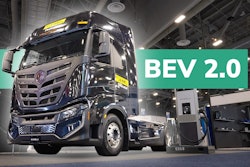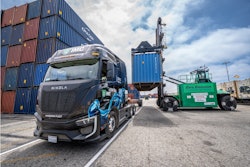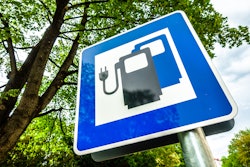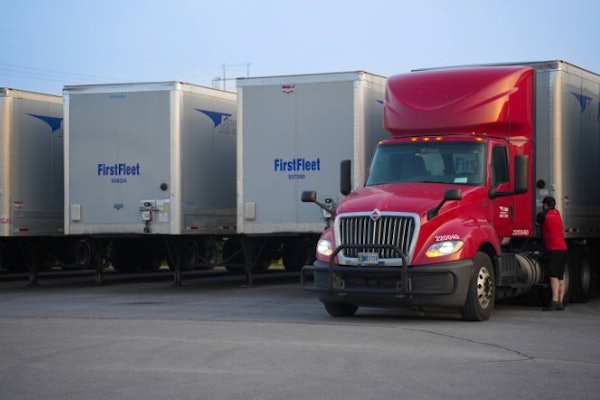Widespread adoption of battery electric trucks is hindered by a number of things, like a lack of infrastructure, high upfront costs, and operational cost savings that may not even exist. A total cost of transport white paper recently released by Ryder – one of trucking’s earliest EV adopters – shows that despite having a very deep bench of electric trucks available in its fleet, demand for them isn’t that high – unless you need something small.
Contents of this video
00:00 10-44 intro
00:29 Electric trucks
01:23 Demand for electric trucks
03:27 Consumer EVs vs commercial EVs
05:24 Infrastructure
07:46 EV maintenance
09:13 Ryder and electric vehicles
Speaker 1:
CCJs 10 44 is brought to you by Chevron Delo, heavy duty diesel engine oil. Now there's even more reasons to choose Delo Rental and leasing was supposed to be the easy access point for heavy duty electrification, so why aren't carriers using 'em? You're watching CCJs 10 44, a weekly episode that brings you the latest trucking industry news and updates from the editors of CCJ. Don't forget to subscribe and hit the bell for notifications so you'll never miss an installment of 10 44. Hey everybody, welcome back. I'm Jason Cannon and my co-host. On the other side is Matt Cole. Like it or not, electric trucks are probably going to be the next biggest thing in trucking at some point, at some point because depending on who you talk to, that point in time is either already here a few years away or a few decades away.
Speaker 2:
EVs right now are making the most impact in a few places where Miles traveled are really low, where cargo volume is low or light or where they are basically mandated like imports and drayage work more widespread adoption is hindered by a number of things like a lack of infrastructure. Obviously, high upfront costs and operational cost savings that may not even exist,
Speaker 1:
A total cost of transport. White paper recently released byryder, one of Trucking's earliest EV adopters shows that despite having a very deep bench of electric trucks available in its fleet, demand for them really isn't all that high unless you need something pretty small
Speaker 3:
Right now. I mean, it's pretty clear that light duty is where the economics may make the most sense today. That's the majority of the units we've leased and put into our rental. We've sold more than 60 units to customers to date. On the light duty side of all the EVs we put in our rental, almost all of them are light duty and it just makes sense. The cost premium isn't as much compared to a gas or diesel equivalent. The charging isn't so much of a barrier. If they all return back home where they're domiciled every night, they can just use level 2, 2 0 8, 2 20 volt charging, same plug as a dryer plug, what people have in their garages. So it's just much less complex. On the light duty side, obviously getting into much larger vehicles, you have heavier weights, a lot more battery to move 'em, which reduces payload.
And then the need for DC fast charging, which is mini X more expensive than just the AC level two charging, not just for the charging hardware, but the installation as well. You're talking four 80 volt, three phase power, a lot to put in the ground. The economics just don't work for most, if not almost all companies. I think the ones you've seen advance with electric tractors have been heavily incentivized, grants whatnot, but the economics really just don't work. You see in the white paper the magnitude of the gap between on the tractor side, electric versus diesel, and then tractor versus van. It's just the magnitude of the gap. So I think it's just tough for all parties, the economics to make it work. It's something, like I said, there's something a lot, we get a lot of conversations about, talk to customers every day about, but everybody wants to get to the cost piece of it. It becomes a different conversation.
Speaker 2:
While sales of passenger EVs have slowed recently, there's no argument that consumer EV demand is exponentially higher than commercial demand, and Darren said, Ryder expected that to a degree.
Speaker 3:
We have a lot of customers that are really excited and willing when it comes to electric tractors in the commercial space, but it's a little bit different than the personal car space in that there's not some, there's much less of an emotional attachment to the vehicle you purchase. It's really about cost. That was really a response to all the questions we were getting from customers is we have the fleet to run the analysis. We have tens of thousands of vehicles on our dedicated side, but we know every metric provide customers with a realistic comparison. That's really what started it. Once you start really looking hard at the numbers, it's probably not surprising. It hasn't taken off. It's not so much a technology thing. I think those who have 'em, drivers seem to like 'em a new technology, it's smooth. So I don't think the technology is necessarily failing. It's just like any new technology. It's a cost premium for being first. An early adopter.
Speaker 1:
There's one big hurdle that EVs need to clear en route to mass adoption and commercial transport, and it's not something that's going to clear by the end of the year. Darren tells us what that is after a quick word from 10 44 sponsor Chevron lubricants.
Speaker 4:
We serve customers from Birmingham, Alabama to the Gulf Coast, so our people and our trucks are booked solid all day. There is no slack in our schedules. These trucks can't break down. I choose an engine oil that takes care of the number one issue with our engines emissions, so we don't have to worry about DPF clotting. I choose the engine oil that keeps our trucks hauling. I choose delo 600 A DF,
Speaker 3:
I think cost. And then I'd say secondly, and it sort of relates to cost, is the infrastructure. I came to Ryder three plus years ago from an electric utility. I did electric transportation program. So familiar with the infrastructure, and there's just a lack of infrastructure, especially on the commercial side. It's very complex. When you look at putting in, let's say you put in 10, 500 kilowatt chargers, five megawatts of power, that's like a highway plaza. If you double that, that's the Empire State Building. So these are huge, huge amounts of power. And there's also other, especially I'm in Georgia, there's other competing businesses for power from the grid. Data centers have become huge in Georgia and really competing for power, so it's definitely an issue. I know that's facing the utility industry. Obviously our grid was built out more than a century ago, and the energy system is a lot different now where you need power, it can be a lot different when it comes to transportation.
So in a lot of cases, the infrastructure both on, you think of a national network that, I mean, it just does not exist in the TCT. We assumed a network just so we could run the numbers and play the scenarios out, but obviously there's not really one that exists for commercial trucks. And then we've seen some pretty high cost just putting in chargers. A lot of buildings don't have three phase power, and so that can really escalate the cost. So it just becomes really complex when you compare that to fueling with diesel and being done in 10 minutes. That brings up another point, just the length of time it takes to charge. Even with a high powered charger, you're looking at over an hour, so not quite to diesel parity quite yet. So I'd say cost infrastructure and then, yeah, a range. I mean, there's really not a great, or there are no sleeper options if you're traveling across the country. There's just not an option there. So yeah, I'd probably rank 'em that way. Level setting early on in the white paper, I mean this is going for now, especially the next six months, like you said, this is going to cost more
Speaker 2:
In May. Dan Priestley, Tesla's senior manager of semi-truck engineering said the company's semi has shown uptime greater than 95%. Darin didn't confirm that 95% figure, but he did say that for the most part, electrics have been reliable, although it's not safe to assume that maintenance expenses will be lower just because a vehicle is electric.
Speaker 3:
I've driven an electric car for different versions for almost 10 years now, so I know that there's maintenance so that the tires wear out a little quicker, I think largely because of weight, and then just the torque, which is fun to do, but it does wear through tires, and you still have all the, I think it's 50, 60% of the parts are the same, obviously fewer moving parts, but you still have wipers and things like that. Tires probably stand out the most, and our fleet maintenance is a small sample size. We haven't seen, there's not an EV truck and it's 10th year of its assistance. But yeah, I think we are seeing less maintenance, but certainly there's still maintenance of course. And then there's different training obviously for high voltage, so I'd almost couch it like the is less, but if something went catastrophically wrong with high voltage, that's probably going to be way more expensive than the equivalent on the gas or diesel side. So that's something we're tracking still early days, I think we're all anxious to see what does this look like in five years as far as how the vehicles are holding up
Speaker 1:
Despite a steel, let's just call it simmering interest in commercial EVs. Darren said Ryder has no regrets about incorporating EVs into its fleet because one, there is still some need and demand there. And two, Ryder's learning about all this technology on the fly, just like the rest of us.
Speaker 3:
We've been very practical with what we go to market with in the last three years, but since I've been here, there are a lot of companies out there with a lot of offerings, but we have a really good process. We have an evaluation team that talks to every OEM with an alternative fuel model, and then we have, that's usually a 90 minute call, and then we have a 90 minute call with the maintenance, sort of a technical review, and then we always demo the units before we put 'em in anyone's hands. So I think that has served us well because there's a lot of noise out there, and I think it's our customers expect us to say, okay, what's real and what's not. So yeah, I think that part has served us well. For sure.
Speaker 1:
That's it for this week's 10 44. You can read more on ccj digital.com. While you're there, sign up for our newsletter and stay up to date on the latest in trucking industry news and trends. If you have any questions or feedback, please let us know in the comments below. Don't forget to subscribe and hit the bell for notifications so you can catch us again next week.










